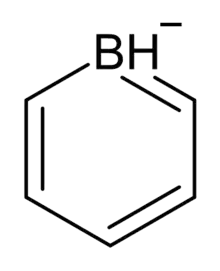 | |
| Names | |
|---|---|
| IUPAC name
Boranuidabenzene | |
| Identifiers | |
3D model (JSmol) |
|
| |
| |
| Properties | |
| C5H6B− | |
| Molar mass | 76.91 g·mol−1 |
Except where otherwise noted, data are given for materials in their standard state (at 25 °C [77 °F], 100 kPa).
Infobox references | |
(C5H5BH)_(OZUFAR).png.webp)
Structure of Rh(C8H12)(η6-C5H5BH).[1]
Boratabenzene is the heteroaromatic anion with the formula [C5H5BH]−. Derivatives of boratabenzene are ligands akin to cyclopentadienyl anion. sandwich or half-sandwich type complexes of many transition metals have been reported.[2][3] Electronically related heterocycles are adducts of borabenzene. The adduct C5H5B·pyridine exhibits properties of boratabenzene anion, i.e., it has the character C5H5B−-N+C5H5.
See also
References
- ↑ Yuan, Yuanyuan; Wang, Xiufang; Li, Yuxue; Fan, Liyan; Xu, Xin; Chen, Yaofeng; Li, Guangyu (2011). "Rapid Entry to Functionalized Boratabenzene Complexes through Metal-Induced Hydroboration at the Anionic 1-H-Boratabenzene Ligand". Organometallics. 30 (16): 4330–4341. doi:10.1021/om200396k.
- ↑ Janiak, Christoph (2006). "Metallocene and Related Catalysts for Olefin, Alkyne and Silane Dimerization and Oligomerization". Coordination Chemistry Reviews. 250 (1–2): 66–94. doi:10.1016/j.ccr.2005.02.016.
- ↑ Cui, Peng; Chen, Yaofeng (2016). "Boratabenzene Rare-earth Metal Complexes". Coordination Chemistry Reviews. 314: 2–13. doi:10.1016/j.ccr.2015.07.014.
This article is issued from Wikipedia. The text is licensed under Creative Commons - Attribution - Sharealike. Additional terms may apply for the media files.